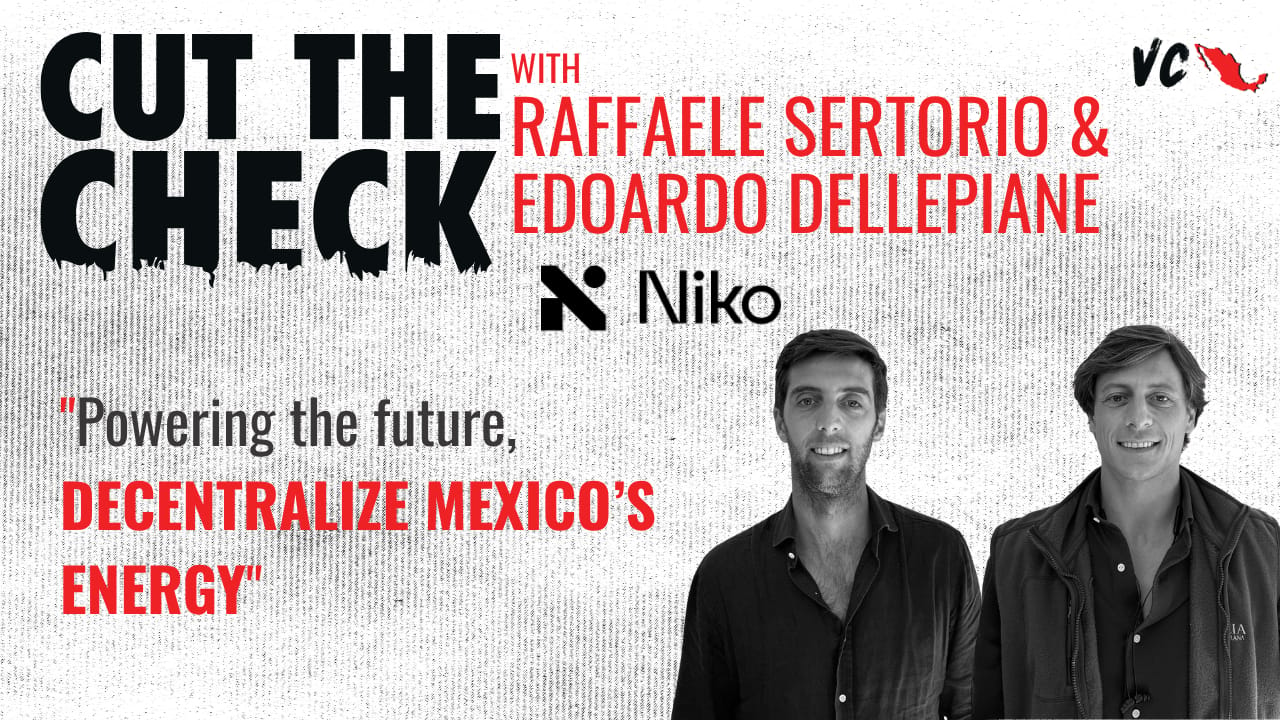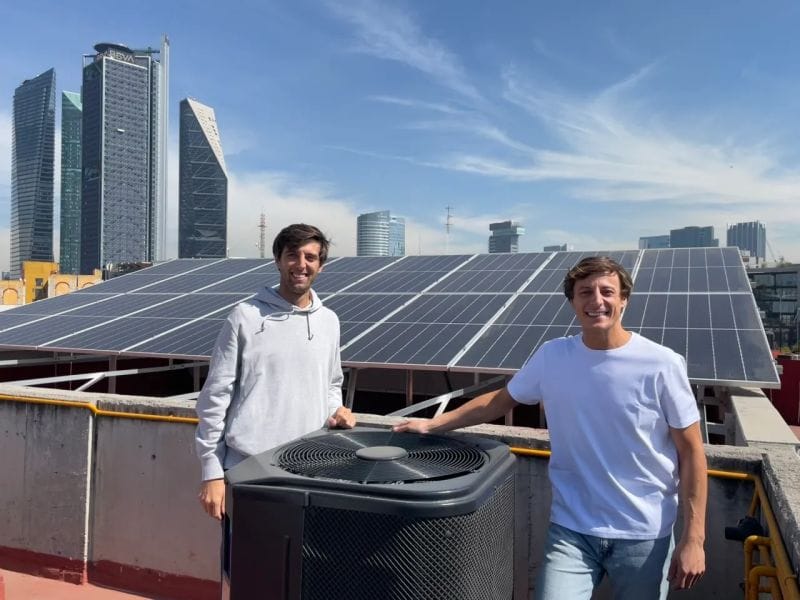- Venture Capital Mx
- Posts
- VC Mx: Raffaele Sertorio, Co-Founder Niko Energy
VC Mx: Raffaele Sertorio, Co-Founder Niko Energy
Niko Energy is accelerating solar adoption in Mexico by removing financial barriers and simplifying the switch to clean energy for homes and businesses.

Receive Honest News Today
Join over 4 million Americans who start their day with 1440 – your daily digest for unbiased, fact-centric news. From politics to sports, we cover it all by analyzing over 100 sources. Our concise, 5-minute read lands in your inbox each morning at no cost. Experience news without the noise; let 1440 help you make up your own mind. Sign up now and invite your friends and family to be part of the informed.
Niko Energy is a clean tech company focused on accelerating the adoption of solar energy in Mexico. The company aims to address the country's low solar penetration, which currently stands at only 2-3%.
By providing seamless financing solutions and efficient installation processes, Niko Energy removes barriers for businesses and households looking to transition to solar power.
Niko Energy is about making solar power the obvious choice. We saw that in Mexico, solar adoption is still below 2-3%, despite its clear economic advantages. The challenge wasn’t just affordability but accessibility. That’s why we built a solution that simplifies the process, removes financial barriers, and helps businesses and households transition to clean energy seamlessly.
The company offers a financing model where customers pay less for solar power than they would for traditional utility bills. Over time, they gain ownership of the system, ensuring long-term savings.
The Origin of Niko Energy
Niko Energy was founded in June 2023 by Raffaele Sertorio and Eduardo, both Italian entrepreneurs who moved to Latin America in pursuit of business opportunities. Their journey began in the cloud kitchen sector, where they co-founded Cocinas Ocultas.
After scaling operations across multiple countries, they decided to take a break and reassess their next venture.
We had very clear that we wanted to go back into entrepreneurial endeavors.This time, we were in a position to take our time to actually pick the right sector, the right thing to do. And eager to do something positive for this world, we started looking at clean tech as a whole.
After extensive research, they recognized the massive opportunity in Mexico's solar energy sector. With little technological advancement and a fragmented market, they saw a chance to build a company that could drive widespread solar adoption.
How Niko Energy Works
Niko Energy makes switching to solar easy and affordable. Unlike traditional providers, Niko eliminates upfront installation costs and offers financing options where customers pay less for solar than their current electricity bills.
The Process
Request a Quote – Customers submit their CFE bill, and within minutes, they receive an estimated cost and savings calculation.
Site Assessment – Niko conducts a remote evaluation using drone technology, ensuring accurate measurements and recommendations.
Installation & CFE Connection – Certified technicians install the solar panels and handle all interconnection procedures with CFE.
Start Saving – Within 30-40 days, the system is fully operational, cutting electricity costs by up to 99%.
Our mission is to remove the friction that prevents people from switching to solar. We’re not just offering a product, we’re offering a smarter way to power homes and businesses without the headaches that have traditionally come with it.
Founders

Expanding to Underserved Markets
While Niko Energy primarily focuses on businesses, the company has also identified opportunities to support small family-owned shops in underserved urban neighborhoods. These businesses can benefit from asset-backed financing, where the solar system itself serves as collateral.
We focus on businesses that were previously underserved. The real change is solar communities,installing solar systems remotely and selling clean, affordable energy to rural areas.
He emphasized that once regulations evolve, this model could dramatically change energy access for rural areas without requiring traditional credit approval processes.
Driving Enterprise Adoption with AI and Solar Solutions
Niko Energy is seeing growing interest from corporations transitioning to solar, though many are unfamiliar with available solutions.
Surprisingly, many companies have never heard of this option. We educate them, and they realize it’s a viable cost-saving strategy.
To build trust, Niko offers pilot programs, providing financial benefits before scaling adoption. Meanwhile, its AI-powered "Niko Engine" streamlines operations, cutting costs and boosting efficiency.
With AI, we operate at half the headcount of a traditional company, lowering prices and maximizing savings, making our solution an even easier choice.
Initial Challenges and Misconceptions
One of the biggest challenges Niko Energy faced was the lack of a sophisticated, tech-enabled solar market in Mexico. Most solar businesses serving small and medium-sized projects were family-owned, operating within limited geographical areas. This resulted in long wait times for quotes, limited financing options, and a lack of streamlined service.
On the client side, if you want to move to solar, despite the fact that the savings are huge, you need to wait three days, four days, up to weeks for a quotation.Then you need to find your own financing solution, and there’s a lot of paperwork. It’s so painful for the client that many of them drop out during the process.
Another major misconception was that solar energy was only for the wealthy or environmentally conscious. Many potential customers did not realize that switching to solar could lead to significant cost savings, especially for businesses facing high electricity bills.
We usually run into the problem that it’s too good to be true. We have conversations, and then people don’t get it. They ask, ‘What’s the catch?’ But in reality, the model works, and we’re proving it every day.
By addressing these barriers through automation, financing solutions, and a strong customer education push, Niko Energy is positioning itself as a leader in Mexico’s solar revolution.
Funding
2025, $8M (Seed) led by QED Investors including 468 Capital, Picus Capital & Bridge Latam (Now Nazca VC).
Future Plans and Market Expansion
While Niko Energy initially considered regional expansion, the company soon realized the untapped potential within Mexico. With electricity costs rising and solar adoption still below 3%, the focus remains on scaling locally and making solar mainstream.
Expansion sounds like growth, but in reality, it can be a distraction. Mexico’s market is massive, with millions of businesses and households yet to transition. Our focus is on scaling here, refining operations, and making solar mainstream before looking elsewhere.
Beyond simply selling solar, Niko aims to transform how energy is accessed and financed. By streamlining adoption and offering seamless financing, the company is breaking down traditional barriers.
Our goal is not just to sell solar but to redefine how energy is accessed and financed. By simplifying adoption and providing seamless financing, we’re removing the traditional obstacles that have held back the market.
Looking ahead, Niko Energy is positioning itself for long-term impact, anticipating advancements in technology and cost reductions that will further accelerate adoption.
We are not just betting on the present; we are building for the long term. As technology improves and costs decline, Mexico is poised to become a leader in decentralized clean energy solutions.
Market Opportunity
In 2023, Mexico's photovoltaic distributed generation experienced a remarkable 44% growth, setting a new record. Projections indicate that this upward trend will continue, with installed capacity expected to reach 10.8 GW by 2030.
Despite this progress, solar energy currently accounts for only 6% of Mexico's clean electricity, highlighting significant room for expansion.
Across Latin America and the Caribbean, the renewable energy sector is poised for substantial growth. In 2024, the region is set to increase its non-conventional renewable energy generation, particularly in solar and wind, by 30%.
This surge is part of a broader trend, with energy investment in the region projected to reach a record high of USD 185 billion in 2024, with the power sector accounting for over 35% of this investment.
These developments underscore a robust market opportunity for Niko Energy to expand its footprint and contribute to the region's clean energy transition.




Reply